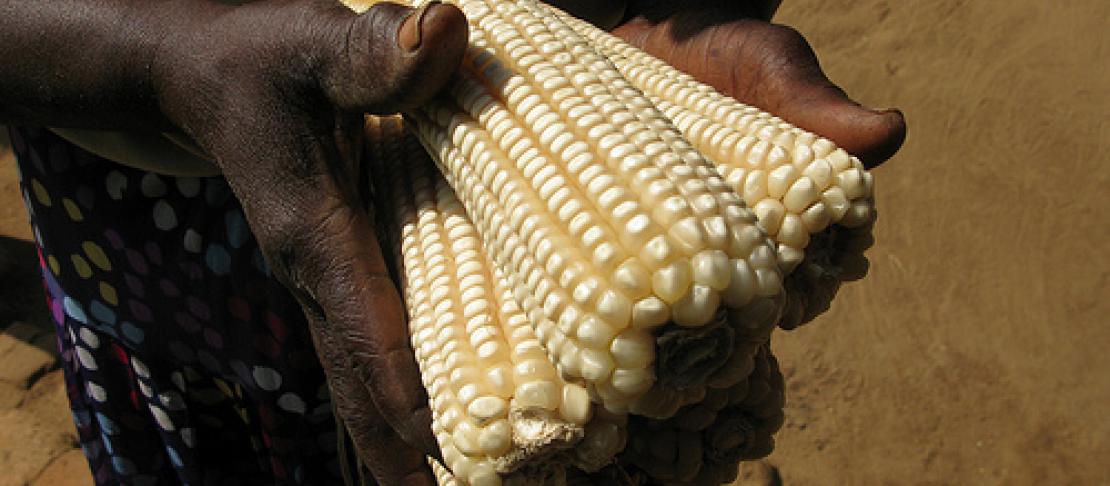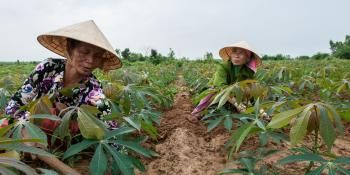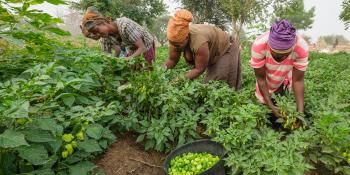Policies, practices and crops to mitigate droughts are crucial in the face of climate change

by Lisen Stenberg and Sonja Vermeulen
The Department for International Development of the UK (DFID) has just won a prize for “Best Technological Breakthrough” at London’s Climate Week, for their support of a project aimed at developing drought-tolerant maize in Africa. The innovation is the result of research by the International Maize and Wheat Improvement Center (CIMMYT), one of the CGIAR research centers. The new crop varieties are designed to resist climate change-induced water shortages, and they already being used by 2 million smallholder farmers in 13 countries in Sub-Saharan Africa.
Reports recently released by the CGIAR Research Program on Climate Change, Agriculture and Food Security (CCAFS) and the School of Geography and the Environment at Oxford University show that the impacts of climate change on rainfall in West Africa and East Africa will be complex, but that some areas are highly likely to become drier. One of the main impacts of climate change is expected to be increasing temporal variability in rainfall, so that agricultural areas will experience more frequent dry spells during the growing season, and more frequent drought years that lead to failed harvests.
Drought tolerance is a highly prioritized research area within the CGIAR
Many of the CCAFS research partners are working on drought tolerance, in terms of resilience both to water stress and to heat stress. Some of the work, like that of CIMMYT above, focuses on development of improved varieties, not only for staple cereals like maize and rice, but also for other nutritious crops. Researchers from the International Center for Tropical Agriculture (CIAT) and the International Institute of Tropical Agriculture (IITA) are developing drought-resistant varieties of cassava, an important staple crop that shows promise to endure the effects of climate change. Much of this research is done directly with farmers. Bioversity International is working with farmers in Malaysia and Bolivia to match and test genetic material from national genebanks against the qualities, including drought-tolerance, that farmers most value in their own stores of rice seed and potato varieties.
Improving farming systems and protecting farmers from the effects of droughts
As well as research on drought-tolerant varieties, CGIAR researchers are working on improvements to farming systems in the face of drought. For example, researchers at the International institute for Tropical Agriculture (IITA) have looked into a number of different coffee production systems in East Africa. They found that when coffee plants are grown together with banana crops (in a so-called intercrop system) and combined with shade trees, the coffee plants become more drought-resistant and can produce larger yields.
Also, the International Center for Agricultural Research in the Dry Areas (ICARDA) are monitoring the reactions of different crops (wheat, maize, red pepper, faba beans, chickpeas and lentils) to different irrigation levels in Morocco and Syria. This work is linked to evaluations of different techniques of water harvesting, including contour ridges, cisterns and check dams, conducted in Jordan, where the dry conditions correspond to possible futures for farms across drier parts of West and East Africa.
A further layer to CGIAR research on drought-tolerance under climate change is finding new ways of providing the institutional and financial support that will enable farmers to plan for and survive droughts. Two major fields of work, which we have covered widely in earlier blog posts, are improving farmers’ access to reliable weather forecasts, particularly at the seasonal scale, and providing insurance linked to weather indices, to provide farmers with an affordable means of protecting themselves from losses of crops and livestock.
To learn more about research innovations that support food security in the face of climate change, follow our live coverage from the Planet Under Pressure conference this week on this blog, and also on twitter @cgiarclimate and facebook.
This blog story was co-written by Lisen Stenberg, Intern, and Sonja Vermeulen, Head of Research at CGIAR Climate Change, Agriculture and Food Security (CCAFS).


